- Home
- Upton Sinclair
Dragon Harvest Page 25
Dragon Harvest Read online
Page 25
Laurel Creston was in a different case; she didn’t have any stolen property; she had a car which she had bought in Germany, paying spot cash and getting the dealer’s receipt. Lanny was amused to speculate on the question of what she would do with it; would she learn to drive it and blossom out in style, or would she sell it and use the money to prolong her European tour? Certainly she had earned it, for she must have been under intense nervous strain, from the moment she gave her consent on Friday morning until she was past the Dutch border on Sunday afternoon. It had been a test of character—for Lanny felt certain that she hadn’t done it for the sake of the money; she had done it for the cause which Monck represented, and which he had convinced her was the cause of freedom and decency.
Lanny had no trouble in imagining the scenes, for he knew both the persons and had written the whole scenario. It had been a test of a woman’s nerve, as well as of her belief in the cause. Lanny thought: “She’s a real person”; he thought: “I ought to know her better.” So there started up that old argument in his mind. How could he know her? How could he be seen with her, or she with him? No, it was absurd to think of, and would just be shirking his duties to F.D.R. Why did he always have to be yielding to temptation and thinking about some woman? Right now he ought to be thinking about what message he would get off to Washington, and what information he would give to Ceddy Wickthorpe and the other Foreign Office men in England.
At the Hook of Holland Lanny went on board the long narrow nightboat, very comfortable, very safe. He was in a free land now, and shut himself up in his stateroom and set up his little portable and went to work. He wrote that Hitler had definitely made up his mind to take Danzig and the Corridor, and that the time would be not longer than six months. He wrote that Hitler would probably force the issue and take the whole western half of Poland; the Führer’s former statement that he wanted nobody but Germans was now forgotten, as he was showing in the case of the Czechs. The P.A. wrote that Hitler was seriously thinking of some sort of deal with the Russians, possibly giving them the eastern half of Poland and thus beating the others “to the draw.” He added that the high-up Nazis were dubious about the outcome of these ventures, and were salting away money and property abroad; but the Führer’s will was implacable, and when it came to a showdown not one would refuse to obey him.
VIII
The passage across the foot of the North Sea took all night. It happened to be a stormy night, and when that ferry boat got into the open it rolled in a most disturbing fashion. Lanny began to feel queer inside, and kept on feeling that way for many hours. If he had any of those psychic gifts which he studied so eagerly in others, he might have got some sense of painful events going on back in Berlin, in that New Chancellery building which he had visited only a few days ago. For this was the night, or rather the small hours of the morning, when the death warrant of the Czech Republic was signed.
Poor old President Hacha! After the military honors and the flowers and the box of candy, he and his minister were taken into Hitler’s splendid office and had the document set before them. The Führer made a brief speech; this was the agreement, and all the visiting pair had to do was to write their names on it. Bohemia and Moravia were to become a part of the Third Reich, and Prague was to be occupied the next morning. If Hacha and his minister refused to sign, the thousand bombers would fly and the city would be wiped out of existence. That was all; take it or leave it.
After that speech, Hitler wrote his name and then left the room, bequeathing the elderly invalid to the tender mercies of Ribbentrop and Göring. The two Czechs protested against the outrage, and Göring’s answer was that the air force already had its orders; it was to fly at six A.M. There was the document; sign. Göring held out the pen, and when the horrified president shrank from it, Göring pursued him around the table. Sign, or the bombs will soon be falling.
Hacha fell into a faint and had to have restoratives. The thoughtful Führer had ordered his physicians to be on hand, and the sick man was revived. He declared that he could not sign without consulting his Cabinet. All right, there was a direct telephone line—the thoughtful Führer had seen to that, also, and the president might do his consulting at once. The president collapsed again, and again was revived. Such was the duel of wills going on all night, while Lanny Budd was being rolled by the great waves which started in the Arctic Ocean and came sweeping down the coast of Norway, and to the foot of the North Sea as if into a funnel. It was half-past four in the morning when the almost-dead man wrote his name on the death warrant of his country, and already German troops were crossing the border in a dozen places. While Lanny was leaving Harwich they were entering Prague, and when he got to London the extra editions of the newspapers were announcing that the Führer himself was on his way to make a triumphal entry into the Czech capital.
IX
In times such as this a man couldn’t very well think about anything but politics. As soon as he came ashore at Harwich, Lanny had phoned to Rick, saying that he had a load of news; Rick took the train, and no sooner had Lanny got settled in the Savoy than his friend appeared. And then what a feast of misery they had! There was no chance of this hotel room being wired and they didn’t have to go for a drive in order to enjoy privacy. They could say what they thought, in a tight little island that had been free since the days of Magna Charta; but how much longer would it be free—with despotism spreading like black thunder clouds over the European sky?
Eric Vivian Pomeroy-Nielson was a man who took his politics hard; his belief in democratic Socialism was his religion, and the events of this hour were to him no vague and far-off abstractions, but personal tragedies which he witnessed with his mind’s eye and felt to the depths of his soul. He had been in a state of rage mingled with despair ever since “Munich”; and now he saw the worst of his forebodings being realized—a melancholy satisfaction indeed. It so happened that the sudden death of Prague fell at the same time as the last agonies of Spain; in these black hours traitors were tearing that republic to pieces, and starving, disease-ridden Madrid was to collapse in a couple of weeks.
Rick was only a year and a half older than Lanny, but already his hair was showing signs of gray. He didn’t have his friend’s happy faculty of losing himself in a piece of music or the study of a great painting; he worried about the world which he couldn’t save; he saw it rushing toward a precipice, and he shouted warnings which very few heeded. He had been a successful playwright, and could still have been if he had been willing to cater to the “carriage trade”; instead he wrote political articles, and turned the news which Lanny brought him into diatribes signed “Cato.” Of late he had been so violent in his anti-Fascism that Lanny was afraid to visit his home, and met him privately in hotel rooms.
Lanny had never mentioned F.D.R. to his friend, and now he didn’t mention the supercharger; but he was free to tell about his talks with the Nazi leaders, and about their intentions. Rick, a skilled journalist, would know how to use this information without giving any clue as to its source. For years he and Nina had avoided mentioning Lanny to their friends, and the general assumption was that the son of Budd-Erling had drifted away from interest in the leftwingers and their ideas. That was something to be expected; it was in accord with the materialistic interpretation of history, and when it happened, the rigid Marxists would shrug their shoulders and say: “You see? It’s the class struggle.”
Rick was in such a state of fuming that he could hardly sit still; he wanted to pace the floor in spite of his lame knee. “Blind imbeciles” was the kindest phrase he would find to characterize the people who guided his country’s destinies in this crisis. He told of something which Alfy, his oldest son, had told him: in London on the previous day one of the newspaper placards had proclaimed, in letters half a foot high: “ANOTHER GREAT STAND!” “And what do you think that was?” inquired the father. “A stand of the British Empire against the madman who is tearing Europe to pieces? No—it was a cricket match!”
; Rick’s favorite thesis was that this blindness of the British rulers was not accidental. “Class is more than country,” was his formula to describe the “Cliveden set,” as it was called. They didn’t want to fight Hitler, because they believed that he had found the answer to the peril of labor unionism, which was steadily encroaching upon the privileged classes in every land where industrialism had made advances. Hitler had taught labor its place, and was going to crown his career by exterminating Bolshevism. If he would do that, the British landlords and press-lords and beer and coal and shipping and money lords would be perfectly willing to allow him a big chunk of Europe as his reward.
Never had this thesis seemed more clearly justified than in these last critical days. “The Government are disturbed, of course,” declared the one-time aviator; “they are afraid of any sort of change, and especially when it is sudden. But they don’t care a tinker’s dam about Czechoslovakia; they don’t care about a republic, they don’t care about freedom. When they know that a murder is being committed, they just look the other way. To read our great press this morning makes you want to vomit.”
“I had enough of that on the Channel last night,” smiled Lanny. “I take it I was right in telling Hitler that Britain won’t fight for Prague.”
“You were right, but I don’t think you should have told him.”
“Trust me, old man. I had reasons.” That was the nearest a P.A. could come to self-justification.
X
Rick went off to discuss with an editor the information which Lanny had brought him; and Lanny sat at the telephone and called the Foreign Office in Whitehall. He guessed that in a time like this the hardworking Ceddy Wickthorpe would be at his desk, and so he was. “I have just come from Berlin,” said the American. “I talked with Number Two the day before yesterday, and with Number One just before that. They gave me messages for you.”
“Ripping!” exclaimed his lordship. “Can you drop in?”
“No doubt you’re busy now. Are you free for dinner?”
“Come to the club, and we’ll have a room. I’ll bring Gerald.”
“O.K.,” replied the American.
“By the way,” added the fourteenth Earl of Wickthorpe, “the Prime Minister is going to make a statement to the Commons in a couple of hours. You might like to attend.”
“By all means—thanks.”
A day of thrills for a dabbler in international crises! Lanny got Prague on his radio and heard a correspondent describe the behavior of the people of that city while the German troops were entering. Apparently the invaders hadn’t yet got their censorship going, and the reporter described women standing on the sidewalks with tears streaming down their cheeks. And then, a little later, all airlanes were cleared—Hitler was going to tell the Czech people about their future. Lanny listened to that raucous voice which he knew so well, bellowing the message of Lebensraum which had been Adi’s obsession for the past two decades, ever since, as a police spy in Munich, he had taken charge of a group of seven bewildered Bavarians who were calling themselves the National Socialist German Workingmen’s Party. Only six months ago the Führer had shouted to the world: “I want no Czechs!” Now he told these same Czechs: “For a thousand years Bohemian and Moravian lands were part of the Lebensraum of the German people.… It is by the law of self-preservation that the German Reich is determined to intervene again decisively to erect the foundations of a reasonable European order and proclaim decrees accordingly. Germany has already proved in its thousand-year-old past that, by reason of its size and the character of the German nation, it alone is predestined to solve these problems.”
After which Lanny took a stroll to Westminster and entered that mass of brownstone Gothic buildings in which was housed the “Mother of Parliaments.” Wickthorpe had got him a ticket to the visitors’ gallery, and he climbed into one of the topmost seats, looking down into a narrow chamber, only seventy feet long, in which the destinies of the British Empire were debated. The speaker sat at the head of a long table in the center, with a wig on his head and the mace of office in front of him. The members sat on uncomfortable benches ranged on both sides of the oblong table. Until recently they had all worn top hats; then the labor members had heralded the social revolution by appearing in caps. Now an excited debate was under way, and the visitor from overseas was cheered to make the discovery that there were a few members of this august body who cared about freedom and democracy and had voices to shout it to the world.
In came the tall and lanky, black-clad and solemn manufacturer who had once been Lord Mayor of Birmingham and now was head of the Conservative Party and of the British government. He had left his rolled black umbrella in the cloak room, but had brought his cadaverous face and prominent Adam’s apple behind an old-fashioned wing collar. In a dry dull voice he told his party, his people, and such others as might care to read about it, that he had “so often heard charges of a breach of faith bandied about,” which did not seem to him “to be founded upon sufficient premises.” He went on to declare: “It is natural that I should bitterly regret what has occurred. But finally do not let us on that account be deflected from our course. Let us remember that the desire of all the peoples of the world still remains concentrated on the hopes of peace and of a return to the atmosphere of understanding and good will which has so often been disturbed.”
So that was that; and the Führer of the Germans could be sure that any time he wanted to murder another republic, the British Prime Minister would bitterly regret it. Lanny went back to his hotel to dress for dinner; and there he turned on the radio and heard that Hungarian troops had crossed the borders of the Carpatho-Ukraine and were driving disorganized Czech troops before them. A new Hungarian government was expected to take power, one that was pro-Nazi and anti-Semitic, and the report was that Hitler had agreed to let this government have that portion of Czechoslovakia which was immediately adjacent to Hungary.
XI
The fourteenth Earl of Wickthorpe was a serious-minded and conscientious English gentleman. He possessed a magnificent estate and his rich American wife made it unnecessary for him ever to worry about the high taxes which were ruining so many of his fellow peers. He might have taken things easy and enjoyed his life, but he had chosen a job as a career man in the Foreign Office, something which meant hard work, and was unusual for one in his station. His title wasn’t exactly a handicap, but it made him conspicuous, and made it harder for him to withdraw his hand from the plow, once he had put it there. Especially was this true now, when the British Empire, which was his life, found itself suddenly in such dire peril. The realization of this was slowly penetrating the minds of high-ranking Englishmen, and it kept Ceddy Wickthorpe chained to his desk in dreary smokestained London when he would far rather have put on an old raincoat and boots and gone wandering over his lawns and meadows, looking at horses and cows and deer, rabbits and dogs, swans and geese.
His relationship to Lanny Budd was peculiar, since he was married to the woman who had cast Lanny off. Marriages can be broken under the laws of the State of Nevada, but under the laws of nature this one continued on in the form of an eager little girl who was going to finish her ninth year this spring. Frances Barnes Budd revealed in her name that she was part Irma and part Lanny, and so long as she lived her parents could not be entirely separated. Because she was the heiress of a great fortune, her mother wanted her kept safely on the Wickthorpe estate, and that meant that Lanny had to be free to come there and be welcomed as an honored guest.
This wasn’t so hard for Ceddy as it might have been for some other men, for he was the impersonal type of Englishman. When he met you he didn’t ask about the state of your soul, whether you were happy or unhappy, in love or out, prosperous or on the verge of bankruptcy. The nearest he came to intimacy was an inquiry about your cold, or your recent flu. “Beastly weather,” he would say—a remark quite common in London—and then would ask what you thought was likely to be the outcome of Reynaud’s efforts to replace Dal
adier—or it might be Mussolini’s intentions as to Albania. His mind was an encyclopedia of details regarding the affairs of the Empire on which the sun never sets and the experienced group of people who managed it. Really you would have thought that he knew Burke’s Peerage by heart; he could tell you right off that Baron Boskage was the fifth cousin of Viscount Tarpington, and just how that had come about. He could tell you without looking it up the name of the chargé d’affaires at Buenos Aires, whose son he was and what school he had attended.
Now of course he was ready to hear every word the son of Budd-Erlihg had to tell him about the masters of Germany: what they had said, what they were going to do, and when, and how. They sat in a small private dining room in the Carlton Club, Ceddy and Lanny and Gerald Albany, who was Ceddy’s colleague and Lanny’s friend of some years. They paid no attention to the waiter, a well-trained elderly man who was assumed to have no ears except when you gave him an order. What did Hitler really mean, and was he gone quite berserk? He had solemnly declared that he had no further territorial claims on Europe; he had said: “I want no Czechs.” Was he going on breaking his, word like that? And what would be next—Danzig, the Corridor, Memel? It was like living in a kaleidoscope!
XII
The position which Lanny took with these two friends was that of an art expert, aloof and somewhat precious; also a citizen of a neutral country, in that half of the world which had not yet gone mad. The Nazis One and Two gave him commissions, and Number Three was interested in psychic research. They had presumed upon his kindness enough to give him messages, things they wanted influential Britons to understand. All three of the Nazi masters wanted to be friends with Britain, wanted it cordially and genuinely, but only on the terms that Germany must be free to take what she wanted in parts of the world that did not concern Britain. Danzig, the Corridor, Memel, and after that colonies—but not colonies of Britain; no—only those of small nations like Belgium, Holland, Portugal, which had more than they could use and certainly more than they could defend.

 Prince Hagen
Prince Hagen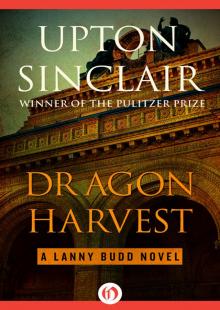 Dragon Harvest
Dragon Harvest The Jungle
The Jungle Sylvia's Marriage
Sylvia's Marriage Oil! A Novel by Upton Sinclair
Oil! A Novel by Upton Sinclair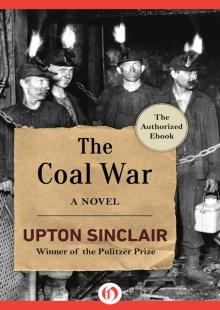 The Coal War: A Novel
The Coal War: A Novel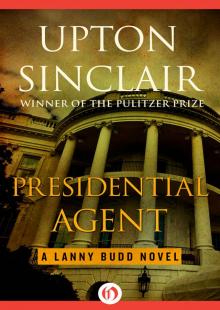 Presidential Agent
Presidential Agent World's End
World's End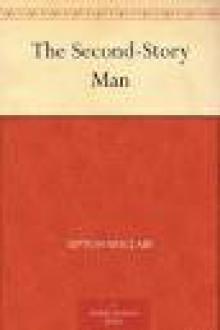 The Second-Story Man
The Second-Story Man O Shepherd, Speak!
O Shepherd, Speak!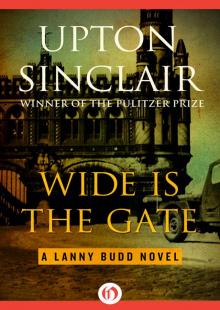 Wide Is the Gate
Wide Is the Gate The Return of Lanny Budd
The Return of Lanny Budd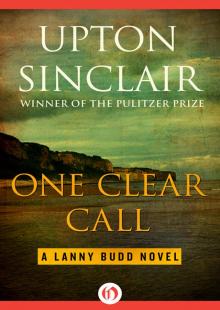 One Clear Call I
One Clear Call I 100%: the Story of a Patriot
100%: the Story of a Patriot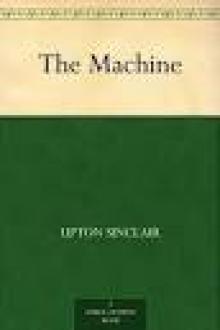 The Machine
The Machine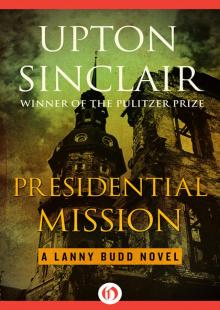 Presidential Mission
Presidential Mission A Cadet's Honor: Mark Mallory's Heroism
A Cadet's Honor: Mark Mallory's Heroism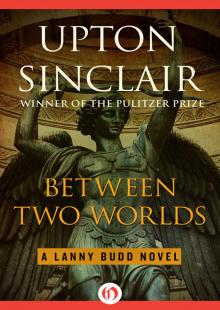 Between Two Worlds
Between Two Worlds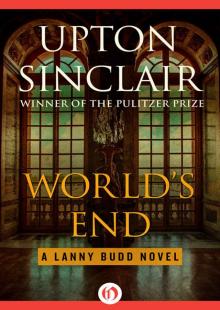 World's End (The Lanny Budd Novels)
World's End (The Lanny Budd Novels)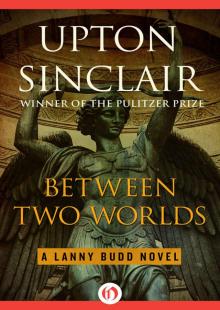 Between Two Worlds (The Lanny Budd Novels)
Between Two Worlds (The Lanny Budd Novels)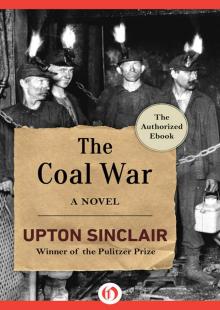 The Coal War
The Coal War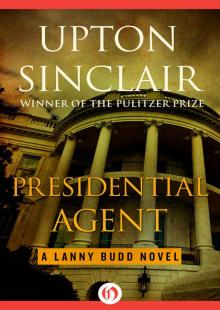 Presidential Agent (The Lanny Budd Novels)
Presidential Agent (The Lanny Budd Novels) Oil (filmed as There Will Be Blood)
Oil (filmed as There Will Be Blood)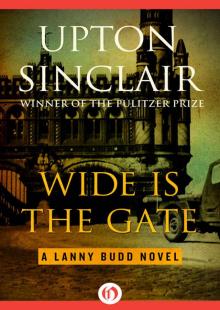 Wide Is the Gate (The Lanny Budd Novels)
Wide Is the Gate (The Lanny Budd Novels)